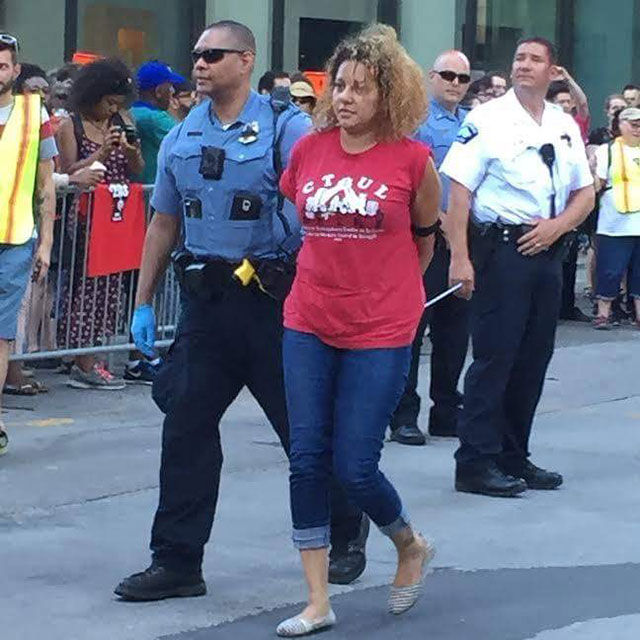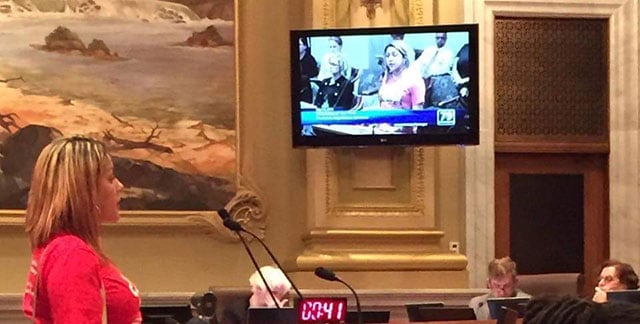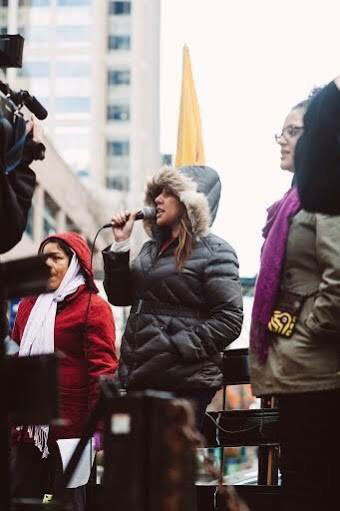
We’re now several months into the Trump administration, and activists have scored some important victories in those months. Yet there is always more to be done, and for many people, the question of where to focus and how to help remains. In this series, we talk with organizers, agitators and educators, not only about how to resist, but how to build a better world. Today’s interview is the 85th in the series. Click here for the most recent interview before this one.
Today we bring you a conversation with Stephanie Gasca, the communications director for CTUL: Centro de Trabajadores Unidos en Lucha, which translates to Center for Workers United in Struggle. Gasca is running for city council in the fourth ward in North Minneapolis.
Sarah Jaffe: I would love for you to start off by talking about what made you decide to run for city council.
Stephanie Gasca: A big part of that was my work at CTUL. I started organizing fast food workers on the ground here in the Twin Cities back in 2014, after the midterm elections in November of 2014. For the midterm elections, I was able to do a Wellstone fellowship, where we were organizing in low-income communities, predominantly communities of color with lower voter turnout, to inform folks about the upcoming elections and the importance of voting in midterm elections.
That, for me, was the first time that I had voted in a midterm election because no one ever told us that these elections were important. Both of my parents are working poor. They worked 80 hours [a week] each for many, many years just trying to keep a roof over our heads and make ends meet. Usually, the way that politics in our country goes is that the folks that are typically impacted by the policy decisions are the ones that are least able to participate in our democracy because of all of the barriers that we are facing and trying to overcome on a daily basis. So, I had never voted in a midterm election. That was my first time.
It was also my first time realizing that you didn’t have to come from a family of politicians or you didn’t have to come from a family of privilege or this expensive background to be able to represent your community. I was just like, “Wow, someone like me, a working mom, who is trying to make a difference in my community can run for office.” That is when the wheels started turning. Then I started working at CTUL immediately after that, organizing fast food workers. My mom worked in fast food for a long time when I was growing up, for poverty wages, and she always worked multiple jobs. So, when I was organizing fast food workers, I thought, “Wow, this is amazing that we can be out on the ground, like many folks, and that they have rights and the right to stand up for what we deserve.” And what we deserve is more than poverty wages that a lot of corporations are paying to workers.
Through that process we started organizing what became Minneapolis Works, which was a package of fair scheduling, raising the minimum wage to $15, paid sick leave and enforcement of all of these things at the municipal level. So, with my work at CTUL, I was organizing workers on the ground, and at the same time, we were organizing the same workers to fight for these things at the municipal level. The Minneapolis Works package ended up getting completely shut down because of big businesses and their lobbying power with our council, so we started doing it piece by piece.
The first piece that was on the table was earned sick and safe time, which is also known as paid sick days. Not only was I up and down organizing the very people that are like, “We don’t have access to paid sick days. I have to send my kids to school sick. I have to come to work sick. My boss will tell me that even if I am sick, I have to come in or I will lose my job and I can’t do that.” I was the only woman of color on the committee that city council had put together to create the language recommendation for the city council to be able to pass this policy. So, at the same time, I am going to these meetings with business owners, big business and small business, corporations within our city to figure out what this policy recommendation is going to look like.
Not only was I moving the work on the ground with the people that are actually impacted by the things that we are fighting for, but also sitting at the table and negotiating and fighting and being the voice for those people that couldn’t be there to ensure that we got some policy that was going to pass that was going to be beneficial to our workers. We passed earned sick and safe time in 2016. At that same time, we were organizing workers in the Fight for $15, and just this past June, we also passed the policy at the city level where we won $15, and that will be implemented over the next several years. There are different schedules for small business and big business.
A lot of that work was seeing the barriers we are facing at city hall, specifically in the ward that I live in … North Minneapolis — and how conservative our councilmember tends to be. Not only that, but she has been our councilmember for 20 years and, before that, members of her family have also held that seat. For one seat on our city council, we have had the same family determining our policies for this specific part of the city for 46 years…. When I look around in my community and I think about the reasons that I got involved in organizing in the first place, the gun violence and all of the different barriers that our youth are facing … that my own family members are facing when it comes to not having access to affordable housing and not having access to jobs that pay a living wage so that folks can work one job and take care of their families, I was just like, “I am going to run for city council! We deserve better and I am going to fight for that.”
I was joking with my kids like, “I love you all so much that I am willing to work a full-time job and be a single mother and run for city council because I believe that we deserve to be represented, and we deserve to have someone in leadership that is going to fight for the people that have been systemically left out of the decision-making process because these barriers impact us more than they do anyone else.”
We don’t have a voice in city hall in the Fourth Ward that is fighting for us, that is stepping up and addressing the racial disparities we are facing, which are some of the worst in the nation all across the board, and we need that. We deserve to have someone that not only understands how the system works, but has also been personally impacted, continues to be personally impacted, and gets up every day to fight to change it….
 Stephanie Gasca is arrested for civil disobedience after police murdered Philando Castile last summer. (Photo: Courtesy of Stephanie Gasca)
Stephanie Gasca is arrested for civil disobedience after police murdered Philando Castile last summer. (Photo: Courtesy of Stephanie Gasca)
We are seeing more people like you … running for office around the country over the last couple of election cycles, but it seems to be happening a lot this year. I wonder if you have some thoughts about why more people coming out of organizing, coming out of movements, are moving towards electoral politics?
I can speak a little bit more specifically to Minneapolis. I know that for me and other organizers who have been on the ground organizing around the Fight for $15 … I think that just as our organizing has become more tied to trying to pass municipal policy, that is one of the reasons why folks are like, “We are going to run.”
For me, anyway, I thought, “I am going to run for city council at the local government level because these decisions that are being made are being made without us and that is how we have ended up with some of the worst racial disparities in the entire nation.” That stuff doesn’t happen accidentally and it doesn’t happen overnight.
I think another thing, too, here in Minneapolis that sparked a lot of energy and anger was the shooting of Jamar Clark [by police] that happened on the North side…. That sparked a lot of outrage and the city’s response — the mayor’s response and some of the councilmembers’ responses to the occupation of the fourth precinct — that also got a lot of folks involved and motivated.
Then … in 2016, the police in Falcon Heights murdered Philando Castile, which was another huge outrage. Even though that is not specifically in Minneapolis, that impacted us here in the Twin Cities on a really big scale. I think that was another big turning point for the politics in our city.
Donald Trump being elected … is another reason that folks are really starting to engage more. Specifically, here in Minneapolis, the fight around workers’ rights issues that we have led at CTUL … and then also the police brutality and the murder of … Black people across our country and the way it has impacted us here locally is another reason that people are just like, “We deserve better. We need folks that understand these issues and that are willing to work hard to change them and go up against the status quo….” This is why I am here.
 Stephanie Gasca testifying at city hall on behalf of paid sick days. (Photo: Courtesy of Stephanie Gasca)
Stephanie Gasca testifying at city hall on behalf of paid sick days. (Photo: Courtesy of Stephanie Gasca)
We had this round of “progressive” elected officials a few years ago and Minneapolis’s mayor was seen as one of these when she was first elected, but she has been heavily criticized really from all sides in office. What have you learned from watching her time in office that you will apply if you are elected?
This is not just for Betsy Hodges, but I think that for white progressives … it is easy to talk [the] talk, but then it becomes a lot harder to actually walk the walk, because, again, a lot of these folks are not impacted in the same way that a person of color who is working class, who is raising their family in the part of the city where we are facing some of the worst racial disparities in our nation … where we always see the least investment.
I think watching the mayor and some of the decisions that have been made and just thinking about my own politics … I am a mother first and foremost. I have a 14-year-old Black son that I am raising here in North Minneapolis, where the police have killed Black men before, where the police harass our Black youth on a regular basis. My politics are automatically different because of my life experiences.
Because of my background … and having our family being hit by poverty wages and a lack of access to education and opportunities, and having my mom being impacted by not having paid sick leave — all of these things, all of these disparities, all of these specifics that everyone loves to go on about … that is my real life. I have a brother who just came home from federal prison in August who I am trying to support right now, helping him and ensuring that he gets a job and ensuring that he has access to the resources that he needs so that he is successful at re-entry and that he is not trapped by the system, because the system is designed to slap folks with a felony and … just keep them going back into the system.
 Stephanie Gasca at a strike with CTUL (Centro de Trabajadores Unidos en Lucha), which translates to Center for Workers United in Struggle. (Photo: Courtesy of Stephanie Gasca)When we talk about children being highly mobile, my niece is living with me right now who hasn’t had stable housing in five years because my sister cannot afford the rising cost of rent. All of these things that we talk about, I am living them every single day. So, my politics are automatically different because this is my life. These aren’t reports that I am reading. These aren’t statistics that I am looking at. This is my life and it is about a fight for my survival. It is about the fight for the survival of my family and my community. That is how I always approach my work because that is what it is. I can’t approach it any other way.
Stephanie Gasca at a strike with CTUL (Centro de Trabajadores Unidos en Lucha), which translates to Center for Workers United in Struggle. (Photo: Courtesy of Stephanie Gasca)When we talk about children being highly mobile, my niece is living with me right now who hasn’t had stable housing in five years because my sister cannot afford the rising cost of rent. All of these things that we talk about, I am living them every single day. So, my politics are automatically different because this is my life. These aren’t reports that I am reading. These aren’t statistics that I am looking at. This is my life and it is about a fight for my survival. It is about the fight for the survival of my family and my community. That is how I always approach my work because that is what it is. I can’t approach it any other way.
On the flip side of that, from observing these people, CTUL is part of some pretty impressive wins, both in getting the $15 an hour minimum wage and other things in Minneapolis, but also in convincing Target that $15 an hour was a good wage for its employees nationwide. One of the things that you will potentially be doing in the city council is dealing with these major corporations. What did that fight teach you that you can use in office?
That has taught me that it is super important that once you get elected that you don’t start working in silos. You have to stay in a relationship with the folks that are on the ground doing the work — whether they are organizing around Black Lives Matter issues, whether they are organizing around police brutality issues, whether it is worker rights issues like CTUL — you have to stay connected to the people that are on the ground, that are outside of city hall, that are doing the work that is going to help move power.
I think on the business side of it, there are businesses that lobby council members, they lobby elected officials day in and day out to try to get their policies passed, to try to move the things that they are trying to move. I think that someone who comes from a struggle who is still struggling, working full-time trying to run a campaign, I know that I have to stay connected and committed to the folks that are on the ground, that are moving the work to break down these barriers and to try to put a dent in these disparities that we are facing.
How can people keep up with you and your campaign?
We have a website www.VoteStephanieGasca.com. You can also find me on social media. I am on Facebook: Stephanie Gasca. We have a campaign page, as well: Stephanie Gasca for Ward 4. And on Twitter at @VictoriousSteph. Then, on our website — our email address and phone number for the campaign is on there.
Interviews for Resistance is a project of Sarah Jaffe, with assistance from Laura Feuillebois and support from the Nation Institute. It is also available as a podcast on iTunes. Not to be reprinted without permission.
Press freedom is under attack
As Trump cracks down on political speech, independent media is increasingly necessary.
Truthout produces reporting you won’t see in the mainstream: journalism from the frontlines of global conflict, interviews with grassroots movement leaders, high-quality legal analysis and more.
Our work is possible thanks to reader support. Help Truthout catalyze change and social justice — make a tax-deductible monthly or one-time donation today.